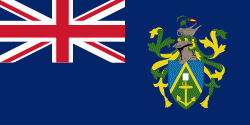New Zealand dollar
$
The New Zealand dollar (tāra o Aotearoa; sign: $, NZ$; code: NZD) is the official currency and legal tender of New Zealand, the Cook Islands, Niue, the Ross Dependency, Tokelau, and a British territory, the Pitcairn Islands. Within New Zealand, it is almost always abbreviated with the dollar sign ($). "$NZ" or "NZ$" are sometimes used when necessary to distinguish it from other dollar-denominated currencies.Introduced in 1967, the dollar is subdivided into 100 cents. Altogether it has five coins and five banknotes with the smallest being the 10-cent coin; smaller denominations have been discontinued due to inflation and production costs.
In the context of currency trading, the New Zealand dollar is sometimes informally called the "Kiwi" or "Kiwi dollar", since the flightless bird, the kiwi, is depicted on its one-dollar coin. It is the tenth most traded currency in the world, representing 2.1% of global foreign exchange market daily turnover in 2019.
Country
-
Cook Islands
The Cook Islands is a self-governing island country in the South Pacific Ocean in free association with New Zealand. It comprises 15 islands whose total land area is 240 km2. The Cook Islands' Exclusive Economic Zone (EEZ) covers 1,960,027 km2 of ocean.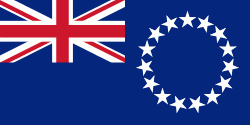
Since 2001, the Cook Islands has run its own foreign and defence policy. In recent decades, the Cook Islands have adopted an increasingly assertive foreign policy, and a Cook Islander, Henry Puna, currently serves as Secretary General of the Pacific Islands Forum. Most Cook Islanders are citizens of New Zealand, but they also have the status of Cook Islands nationals, which is not given to other New Zealand citizens. The Cook Islands have been an active member of the Pacific Community since 1980. -
New Zealand
New Zealand (Aotearoa ) is an island country in the southwestern Pacific Ocean. It consists of two main landmasses—the North Island (Te Ika-a-Māui) and the South Island (Te Waipounamu)—and over 700 smaller islands. It is the sixth-largest island country by area, covering 268021 km2. New Zealand is about 2000 km east of Australia across the Tasman Sea and 1000 km south of the islands of New Caledonia, Fiji, and Tonga. The country's varied topography and sharp mountain peaks, including the Southern Alps, owe much to tectonic uplift and volcanic eruptions. New Zealand's capital city is Wellington, and its most populous city is Auckland.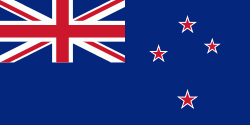
The islands of New Zealand were the last large habitable land to be settled by humans. Between about 1280 and 1350, Polynesians began to settle in the islands and then developed a distinctive Māori culture. In 1642, the Dutch explorer Abel Tasman became the first European to sight and record New Zealand. In 1840, representatives of the United Kingdom and Māori chiefs signed the Treaty of Waitangi, which in its English version declared British sovereignty over the islands. In 1841, New Zealand became a colony within the British Empire. Subsequently, a series of conflicts between the colonial government and Māori tribes resulted in the alienation and confiscation of large amounts of Māori land. New Zealand became a dominion in 1907; it gained full statutory independence in 1947, retaining the monarch as head of state. Today, the majority of New Zealand's population of 5.1 million is of European descent; the indigenous Māori are the largest minority, followed by Asians and Pacific Islanders. Reflecting this, New Zealand's culture is mainly derived from Māori and early British settlers, with recent broadening of culture arising from increased immigration. The official languages are English, Māori, and New Zealand Sign Language, with the local dialect of English being dominant. -
Niue
Niue (, ; Niuē) is an island country in the South Pacific Ocean, 2400 km northeast of New Zealand. Niue's land area is about 261 km2 and its population, predominantly Polynesian, was about 1,600 in 2016. Niue is located in a triangle between Tonga, Samoa, and the Cook Islands. It is 604 kilometres northeast of Tonga. The island is commonly referred to as "The Rock", which comes from the traditional name "Rock of Polynesia". Niue is one of the world's largest coral islands. The terrain of the island has two noticeable levels. The higher level is made up of a limestone cliff running along the coast, with a plateau in the centre of the island reaching approximately 60 metres (200 feet) above sea level. The lower level is a coastal terrace approximately 0.5 km (0.3 miles) wide and about 25–27 metres (80–90 feet) high, which slopes down and meets the sea in small cliffs. A coral reef surrounds the island, with the only major break in the reef being in the central western coast, close to the capital, Alofi.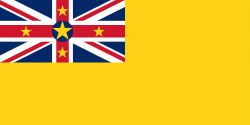
Niue is a self-governing state in free association with New Zealand, and New Zealand conducts most diplomatic relations on its behalf. As part of the Realm of New Zealand, Niueans are citizens of New Zealand and Charles III is Niue's head of state in his capacity as King of New Zealand. Between 90% and 95% of Niuean people live in New Zealand, along with about 70% of the speakers of the Niuean language. Niue is a bilingual country, with 30% of the population speaking both Niuean and English. The percentage of monolingual English-speaking people is only 11%, while 46% are monolingual Niuean speakers. -
Tokelau
Tokelau (known previously as the Union Islands, and, until 1976, known officially as the Tokelau Islands ) is a dependent territory of New Zealand in the southern Pacific Ocean. It consists of three tropical coral atolls: Atafu, Nukunonu, and Fakaofo. They have a combined land area of 10 km². The capital rotates yearly among the three atolls. In addition to these three, Swains Island, which forms part of the same archipelago, is the subject of an ongoing territorial dispute; it is currently administered by the United States as part of American Samoa. Tokelau lies north of the Samoan Islands, east of Tuvalu, south of the Phoenix Islands, southwest of the more distant Line Islands, and northwest of the Cook Islands.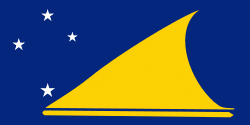
Tokelau has a population of approximately 1,500 people; it has the fourth-smallest population of any sovereign state or dependency in the world. As of the 2016 census, around 45% of its residents had been born overseas, mostly in Samoa or New Zealand. The populace has a life expectancy of 69, which is comparable to that of other Oceanian island nations. Approximately 94% of the population speak Tokelauan as their first language. Tokelau has the smallest economy of any nation, although it is a leader in renewable energy, being the first 100% solar-powered nation in the world.

